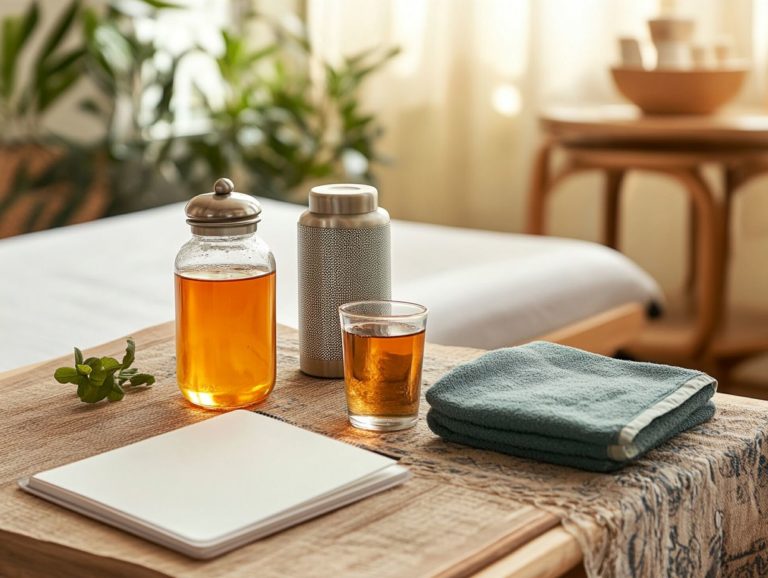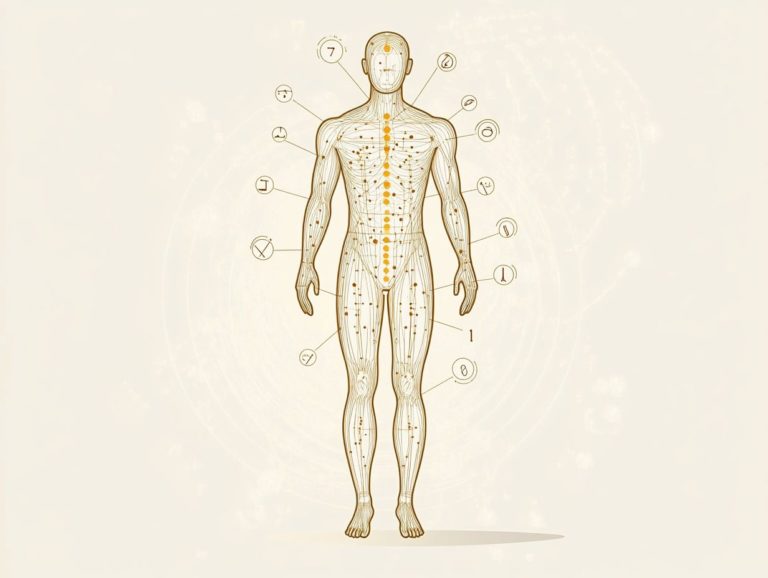5 Essential Oils to Pair with Acupuncture Treatments
Discover the remarkable synergy between essential oils and acupuncture in this enlightening article.
Explore five extraordinary essential oils lavender, peppermint, eucalyptus, frankincense, and rose that can elevate your acupuncture experience.
Gain insights on how these oils complement different treatments, the benefits of incorporating them into your routine, and essential safety precautions to keep in mind.
Whether you re a seasoned acupuncture enthusiast or just starting your journey, this guide will offer valuable insights to enhance your wellness path.
Contents
- Key Takeaways:
- 1. Lavender Essential Oil
- 2. Peppermint Essential Oil
- 3. Eucalyptus Essential Oil
- 4. Frankincense Essential Oil
- 5. Rose Essential Oil
- What Is Acupuncture and How Does It Work?
- What Are the Benefits of Combining Essential Oils with Acupuncture?
- How Do Different Essential Oils Complement Different Acupuncture Treatments?
- What Are the Risks and Precautions When Using Essential Oils with Acupuncture?
- How Can One Incorporate Essential Oils into Their Acupuncture Routine?
- What Are the Other Benefits of Using Essential Oils in Daily Life?
- Frequently Asked Questions: Your Questions Answered!
- What are the benefits of pairing essential oils with acupuncture treatments?
- Which essential oils are commonly used in conjunction with acupuncture?
- How do essential oils complement the effects of acupuncture?
- Are there any potential risks or side effects of using essential oils with acupuncture?
- Can I use essential oils at home to continue the benefits of my acupuncture treatment?
- Are there specific ways to use essential oils during an acupuncture treatment?
Key Takeaways:
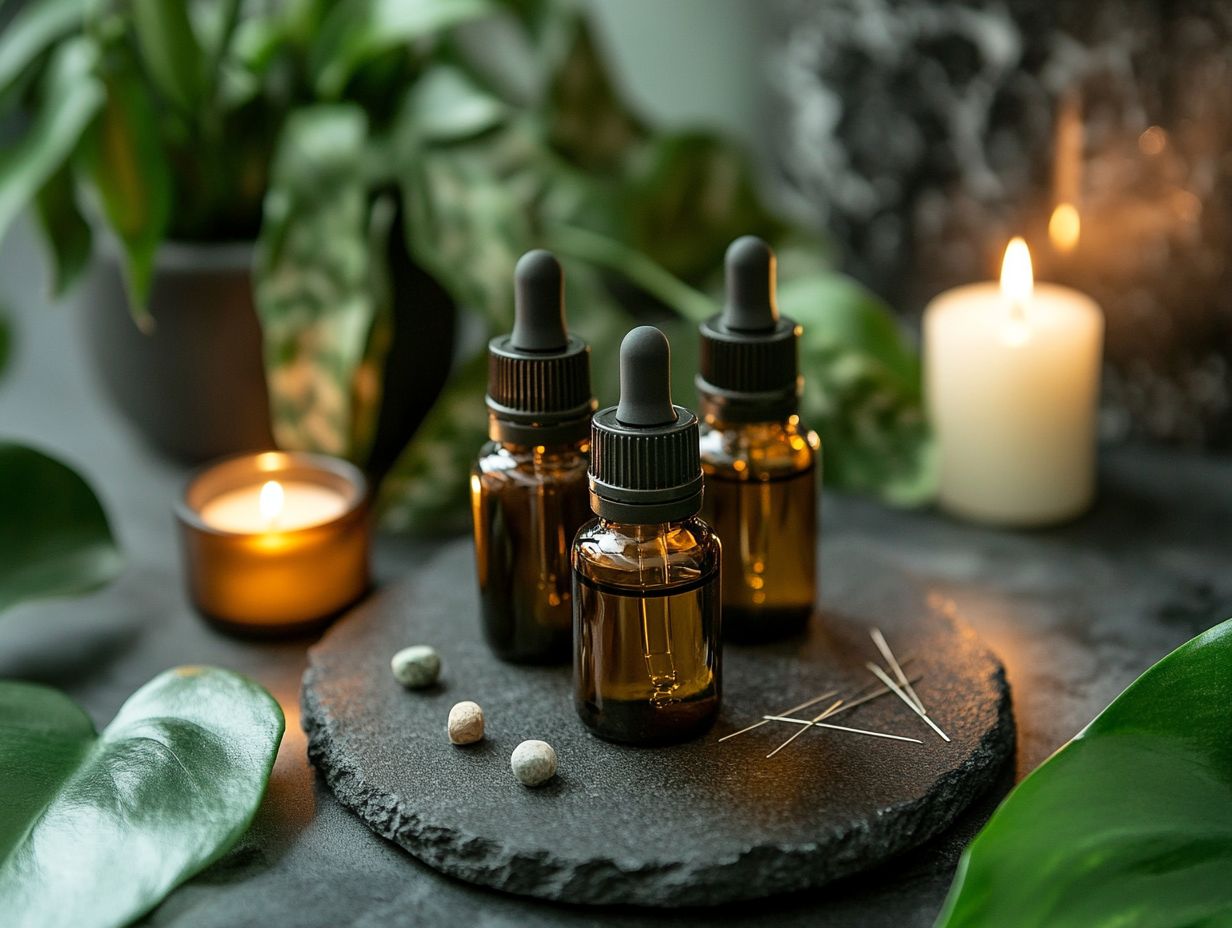
- Combining essential oils with acupuncture can enhance the overall effectiveness of the treatment.
- Each essential oil has unique properties that can complement specific acupuncture treatments.
- Using essential oils in daily life can bring additional benefits such as relaxation and improved mood.
1. Lavender Essential Oil
Lavender essential oil is known for its calming effects. It promotes stress relief and relaxation, especially when integrated into therapeutic practices like acupuncture.
The extraction of lavender oil typically involves steam distillation of the flowers. This oil is cherished not only for its aroma but also for its therapeutic benefits, including reducing anxiety and elevating mood.
Many practitioners recommend using lavender oil alongside acupuncture. Its calming effects can amplify the benefits of needle therapy. Always dilute the oil before applying it topically and conduct patch tests to avoid skin sensitivities.
By learning about the proper use of essential oils, you can ensure a safe and effective integration into your wellness routine.
2. Peppermint Essential Oil
Peppermint essential oil is famous for its invigorating aroma and therapeutic properties. It s effective for pain relief, digestive support, and enhancing mental clarity, making it a great addition to aromatherapy and acupuncture practices.
This versatile oil can be applied topically; just dilute it with a carrier oil (a neutral oil used to dilute essential oils) and massage it onto your temples to ease tension headaches. You can also use it in a diffuser for a refreshing environment that sharpens your focus.
When combined with acupuncture, peppermint oil s ability to stimulate circulation can enhance your overall experience, leaving you feeling rejuvenated.
The menthol content in peppermint is especially effective for gastrointestinal discomfort, making it a go-to for anyone seeking relief from nausea and bloating. Always perform a patch test before applying it topically, and avoid sensitive areas, like your face or mucous membranes, to ensure a safe experience.
3. Eucalyptus Essential Oil
Eucalyptus essential oil is known for its invigorating scent and therapeutic benefits. It offers respiratory support, alleviates congestion, and has antimicrobial properties, enhancing the effectiveness of acupuncture treatments for respiratory health.
Incorporating this essential oil into your wellness routine can be especially beneficial if you re dealing with colds or allergies. Its decongestant qualities help open up your airways, making breathing easier and more comfortable. When paired with acupuncture, it creates a powerful synergy, enhancing your overall care.
Always prioritize safety when using eucalyptus oil. Proper dilution is key, and avoid direct skin contact due to its potency. Choose high-quality essential oils; impurities can reduce their therapeutic value and may lead to unwanted reactions.
Start incorporating these oils today to elevate your acupuncture experience!
4. Frankincense Essential Oil
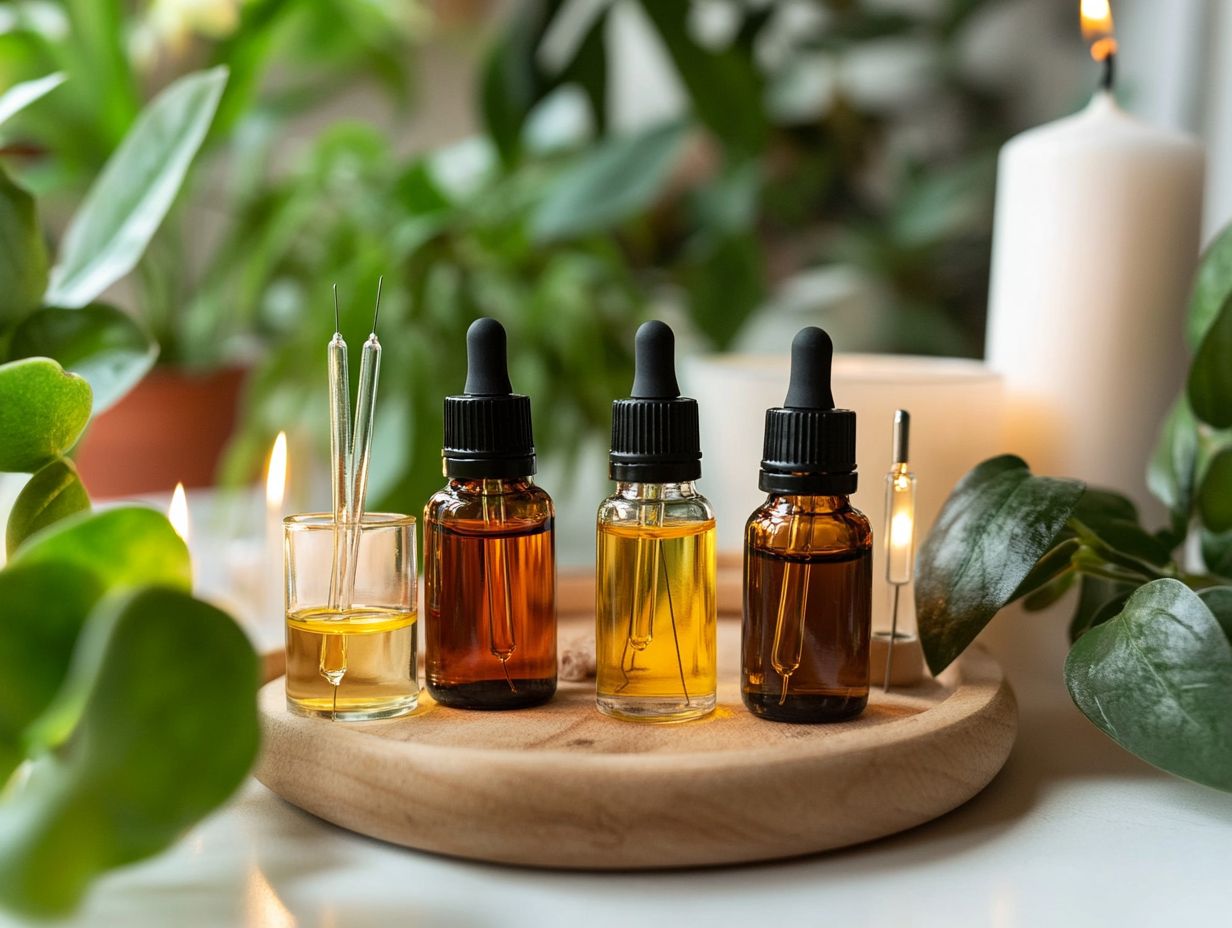
Frankincense essential oil has a rich, earthy aroma. It offers remarkable therapeutic properties and supports emotional well-being.
This oil has historical significance in traditional medicine. It symbolizes purity and protection across various cultures.
Frankincense enhances acupuncture sessions. It nurtures not just physical healing but also promotes mental and emotional balance.
Make sure you apply it correctly to enjoy all its wonderful benefits. Follow safety precautions to avoid any negative reactions.
5. Rose Essential Oil
Rose essential oil is often called the ‘queen of essential oils.’ Its exquisite aroma and powerful benefits make it perfect for acupuncture treatments.
You can use rose oil to transform emotional healing practices. Simply diffuse it for a calming atmosphere or mix it with a carrier oil for a soothing massage.
When applied to the skin, it reduces redness and promotes healing. This enhances the effectiveness of acupuncture by fostering relaxation.
Inform clients about possible allergies and the importance of patch testing. This ensures safe use and maximizes the oil’s benefits.
What Is Acupuncture and How Does It Work?
Acupuncture invites you to experience healing through fine needles placed in specific points on your body. It stimulates the flow of qi, or life energy, fostering healing and balance.
Originating thousands of years ago, acupuncture is tied to traditional Chinese medicine. It targets points corresponding to bodily functions to restore harmony.
This practice releases endorphins, reduces inflammation, and boosts blood circulation. Many find it complements conventional treatments for issues like migraines and chronic pain.
Combining essential oils with acupuncture enhances relaxation. This highlights the connection between mind, body, and spirit.
What Are the Benefits of Combining Essential Oils with Acupuncture?
Combining essential oils with acupuncture offers many therapeutic benefits. It addresses physical and emotional health concerns effectively.
This approach not only alleviates pain but also creates a relaxing environment, which is crucial for your overall well-being.
For example, lavender and chamomile can significantly reduce stress. Meanwhile, peppermint and eucalyptus provide effective pain relief.
Practitioners can guide you in selecting oils that meet your needs. This personalized approach helps you incorporate oils into your routine and optimize your acupuncture benefits.
How Do Different Essential Oils Complement Different Acupuncture Treatments?
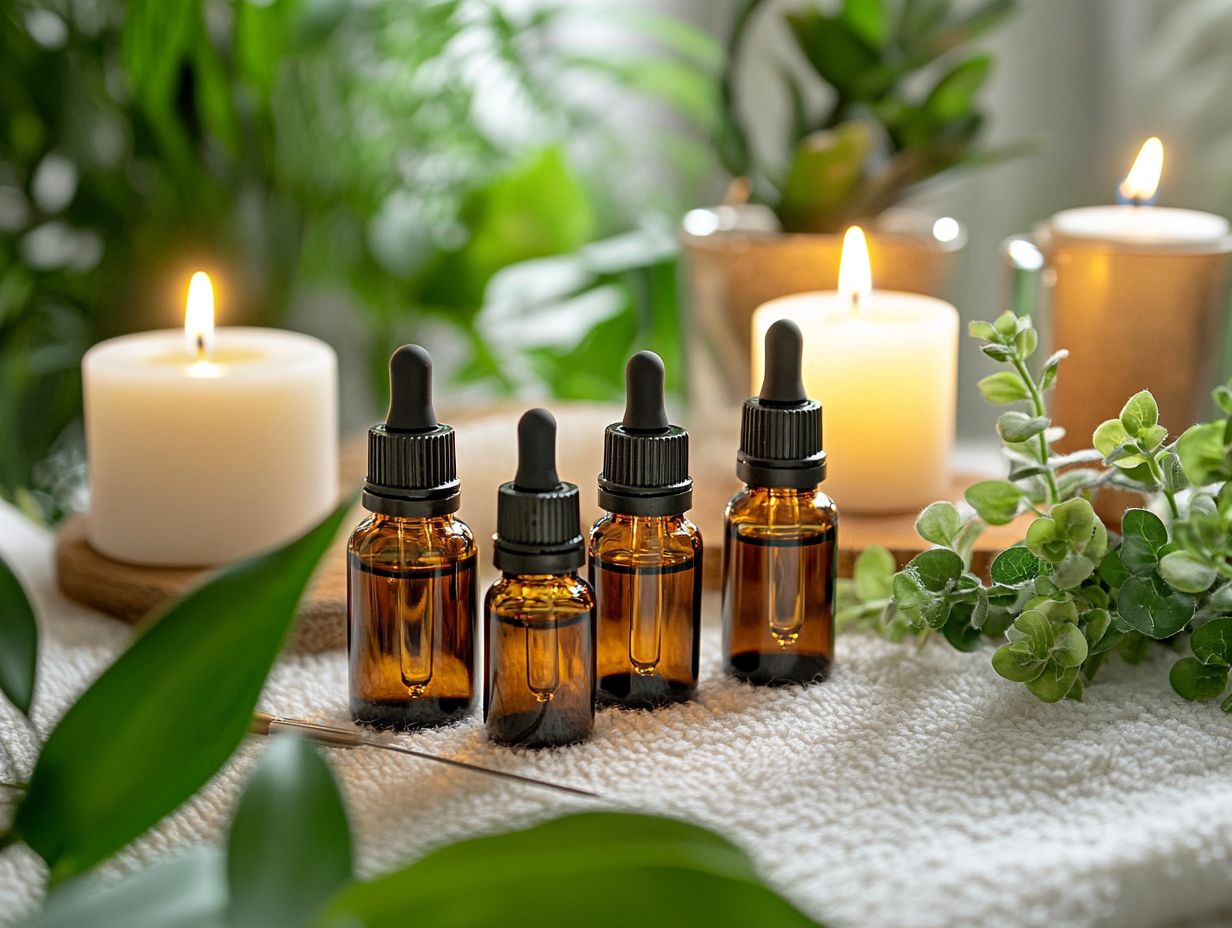
Different essential oils can beautifully complement your acupuncture treatments. Each oil brings its own set of therapeutic properties that can be tailored to your specific needs, enhancing both customization and effectiveness.
Take lavender, for example. Its calming scent is renowned for stress relief and can be seamlessly integrated with acupuncture points associated with relaxation and anxiety reduction.
On the other hand, eucalyptus, celebrated for its respiratory support, can elevate treatments aimed at lung health or sinus issues.
As a healthcare provider, you play an important role in this holistic approach. By assessing individual conditions and preferences, you can create personalized treatment plans that blend essential oils with precise acupuncture techniques.
This collaboration creates a more comprehensive healing experience, allowing you to enjoy the benefits of both the time-honored traditions of acupuncture and the synergistic effects of aromatherapy.
What Are the Risks and Precautions When Using Essential Oils with Acupuncture?
While essential oils provide a wealth of therapeutic benefits, it s vital to understand the associated risks and precautions, especially when used alongside acupuncture. Your safety and maximizing therapeutic efficacy should always be a top priority.
You might encounter allergic reactions to specific oils or face complications due to interactions with other medications you re taking. This highlights the importance of healthcare providers conducting thorough assessments before any treatment begins.
Practitioners should carefully evaluate your individual sensitivities and review your current medications to avoid any adverse effects. It s crucial that you are well-educated about these risks. Knowing how to use essential oils safely, recognizing signs of an allergic reaction, and understanding the importance of reporting any unusual symptoms are necessary steps.
This comprehensive approach fosters a collaborative and safe treatment journey for both you and your practitioner.
How Can One Incorporate Essential Oils into Their Acupuncture Routine?
Incorporating essential oils into your acupuncture routine can elevate your therapeutic experience. It offers additional benefits for various treatment conditions while promoting relaxation and emotional well-being through the art of aromatherapy.
To maximize these advantages, explore several practical methods of integration.
- One effective approach is to use a diffuser in the treatment room, allowing soothing scents to envelop the space and create a serene atmosphere perfect for healing.
- Alternatively, consider the topical application of specially diluted essential oils, providing targeted pain relief and muscle relaxation when massaged onto specific areas of your body.
- Personal inhalers present another convenient option, enabling you to carry those calming aromas with you during and after your sessions.
It s also essential to educate yourself about the correct dosages and properties of various oils. This ensures you can make informed choices tailored to your unique needs for optimal effectiveness.
What Are the Other Benefits of Using Essential Oils in Daily Life?
Discover the amazing benefits of using essential oils every day! These oils can elevate your mood, reduce stress, enhance mental clarity, and address various health concerns with their therapeutic properties. Integrating these oils is remarkably straightforward.
Consider adding a few drops to your facial moisturizer for an extra boost of hydration and rejuvenation. You could also incorporate them into homemade cleaning solutions to create a fresh, uplifting atmosphere.
For instance, lavender is celebrated for its calming effects, and you could use it in your evening rituals to encourage restful sleep. Meanwhile, tea tree oil shines as a powerful antiseptic, making it an excellent addition to your skincare routine.
By weaving these oils into your self-care practices, you not only elevate your overall well-being but also cultivate a nurturing environment. However, act now to learn about essential oil safety, as some oils can cause skin irritation or may not be suitable for everyone, ensuring a positive experience for you and those around you.
Frequently Asked Questions: Your Questions Answered!
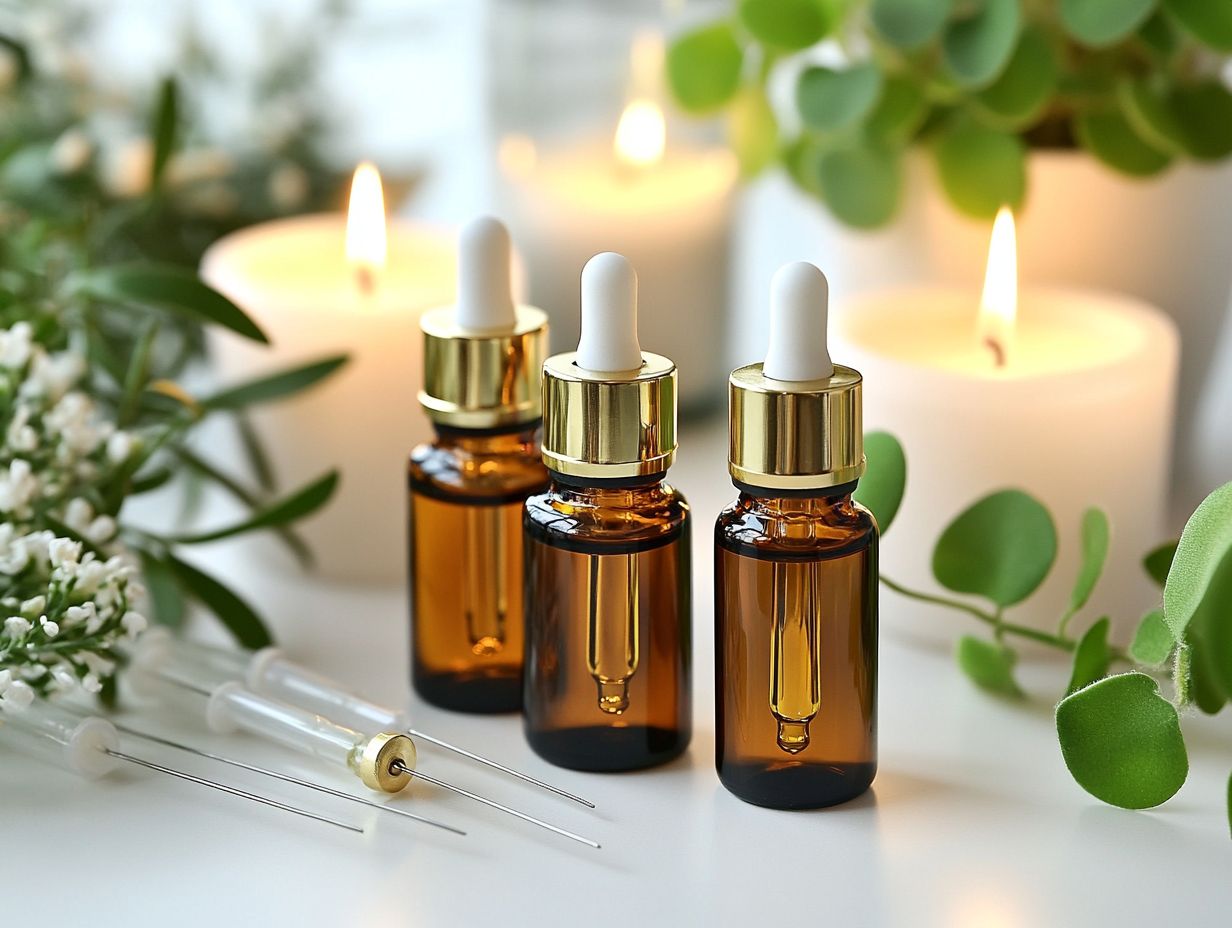
What are the benefits of pairing essential oils with acupuncture treatments?
Pairing essential oils and acupuncture boosts healing. Get ready to feel balanced and relaxed! These oils work together to enhance treatment effectiveness, promoting healing and balance in both body and mind.
Which essential oils are commonly used in conjunction with acupuncture?
Many essential oils can complement acupuncture, but some popular choices include lavender, peppermint, eucalyptus, frankincense, and ginger.
How do essential oils complement the effects of acupuncture?
Essential oils enhance acupuncture in various ways. They help relax your body and mind, improve circulation, reduce inflammation, and boost your immune system. All of these effects support healing and maximize the benefits of your acupuncture treatment.
Are there any potential risks or side effects of using essential oils with acupuncture?
While using oils is generally safe, always check with your acupuncturist about any allergies or sensitivities. This helps you avoid any complications! Some oils may not be suitable for certain medical conditions or medications, so professional guidance is essential.
Can I use essential oils at home to continue the benefits of my acupuncture treatment?
Absolutely! Using essential oils at home can extend your acupuncture benefits. Ask your acupuncturist for the best oils and methods tailored just for you! Always remember to follow proper dilution and usage guidelines.
Are there specific ways to use essential oils during an acupuncture treatment?
Yes! Essential oils can be applied directly to acupuncture points, diffused in the treatment room, or inhaled. Your acupuncturist will help you find the best way to use them for your specific needs and preferences.




